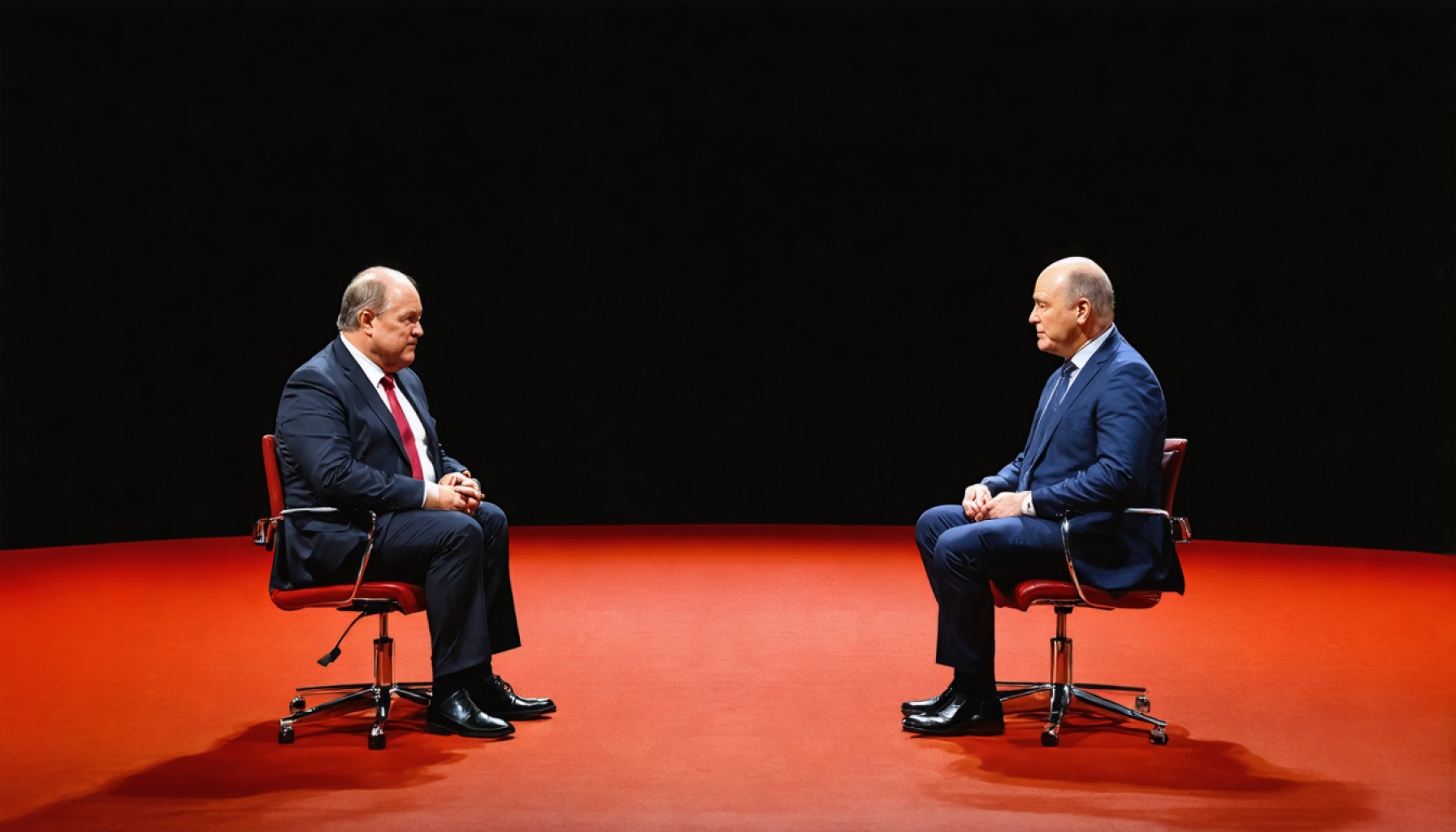- Friedrich Merz and Olaf Scholz are central figures in Germany’s political arena, preparing for a key electoral contest.
- Merz aims to return with renewed vigor, after a period away from politics, showcasing a bold and controlled image.
- Scholz, traditionally reserved, adopts a more assertive approach to address national challenges and redefine his image.
- Both leaders are tested by their distinct political pasts and the need to adapt strategies to contemporary political dynamics.
- Their campaigns, documented by Mathis Feldhoff and Andreas Huppert, expose public and private dimensions while insiders speculate on their potential success.
- Supporters question if Merz’s lead in polls will secure victory, while Scholz seeks to overcome past challenges to triumph.
- The electoral contest is a transformative event shaping Germany’s political landscape and future direction.
Friedrich Merz and Olaf Scholz, two figures standing at the epicenter of Germany’s political stage, command attention as they head towards a defining electoral showdown. Bold contrasts color their campaigns: Merz, known for his fiery, impulsive nature, seeks to project an image of control and statesmanship. Meanwhile, Scholz, traditionally reserved, emerges with a newfound assertiveness, eager to reshape perceptions and bluntly address the nation’s challenges.
The story unfolds like an intricate chess game. Merz, whose political experience primarily hails from his legislative days, angles for a comeback upon discovering a renewed political vigor. After being sidelined by former CDU head Angela Merkel and a stint in the corporate world, his trajectory takes on an air of audacity.
Conversely, Scholz steps into the limelight from his tenure in multiple governmental roles, including Minister under Merkel and Mayor of Hamburg, now grappling with his mixed record as the Chancellor of a sprawling, multi-party coalition. With the specter of previous failures looming, both leaders face the ultimate question: Can they adjust their tactics to reflect the shifting tides?
Witnessed across bustling campaign tours and intimate party deliberations, their journey forces the nation to reckon with its future. The documentary lens of Mathis Feldhoff and Andreas Huppert captures these pivotal moments, peeling back the layers of public and private personas, while insiders speculate on each candidate’s ability to steer Germany’s course.
Merz’s followers wonder if his lead in opinion polls will crystallize into victory, while Scholz embarks on an uphill battle to defy political gravity and pull off an electoral coup. This isn’t just an election; it’s a narrative-driven duel, echoed through streets and screens, reshaping Germany’s political landscape.
Clash of Titans: What Germany’s Political Showdown Between Merz and Scholz Means for the Future
Understanding the Political Battleground
The contest between Friedrich Merz and Olaf Scholz is a critical juncture in German politics, with both leaders representing divergent visions for the country’s future. As the next electoral cycle looms, it’s important to delve deeper into the nuances of their campaigns, the underlying political dynamics, and what this could mean for Germany on the global stage.
Pros & Cons Overview
Friedrich Merz:
– Pros:
– Economic Acumen: With a background in corporate leadership, Merz is seen as a proponent of pro-business policies that might stimulate economic growth.
– Clear Vision: His assertive approach appeals to those seeking decisive leadership and a break from Merkel’s more cautious style.
– Cons:
– Lack of Recent Political Experience: Merz’s time away from politics could be seen as a disadvantage in navigating today’s complex political landscape.
– Divisive Personality: His bold approach may alienate centrist voters who favor compromise.
Olaf Scholz:
– Pros:
– Experienced Leadership: With his extensive governmental experience, Scholz has a proven track record in handling complex issues.
– Moderate Approach: Scholz’s centrist policies appeal to a broad electorate, ensuring stability.
– Cons:
– Perceived Stagnation: Critics argue his incremental approach could result in missed opportunities for reform.
– Mixed Coalition Record: Managing a coalition with divergent interests has limited some policy successes.
Real-World Use Cases: Policy Implications
1. Economy:
– Merz is likely to introduce business-friendly tax reforms to accelerate post-pandemic recovery.
– Scholz might focus on increasing social spending to bridge economic disparities.
2. Climate Change:
– Merz would likely emphasize technological innovation and market-led solutions.
– Scholz would likely prioritize regulatory approaches and strengthen environmental policies.
Market Forecasts & Industry Trends
According to Statista, Germany’s market could respond variably to either leader’s economic policies. A Merz victory may lead to stock market optimism due to anticipated deregulation, while a Scholz win might strengthen sustainable investments through government-driven green initiatives.
Features, Specs & Pricing: Election Campaigns
– Campaign Messaging:
– Merz’s campaign focuses heavily on economic reform and national unity.
– Scholz addresses social welfare improvements and upholding liberal values.
Controversies & Limitations
– Merz’s ties to the corporate world raise questions about potential conflicts of interest.
– Scholz faces scrutiny over his role in past financial scandals which could impact voter trust.
Security & Sustainability
Both candidates see the importance of cybersecurity and sustainable development as crucial for Germany’s future, proposing policies to strengthen infrastructure and support renewable energy sectors.
Insights & Predictions
Analysts from The Economist suggest that the election may hinge on voter turnout among younger and urban populations who are concerned about climate change and digital innovation.
Actionable Recommendations
– For Businesses: Prepare for potential shifts in economic policies by diversifying portfolios and staying informed about regulatory changes.
– For Voters: Engage with policy platforms directly to ensure your priorities align with your chosen candidate.
– For Academics: Assess the potential impacts of each candidate’s victory in sectors like finance, tech, and environmental policy.
Quick Tips
– Stay informed with unbiased sources to navigate political rhetoric.
– Attend local candidate meetings or virtual events to engage directly with policy discussions.
– Use platforms like DW for comprehensive coverage of the election.
In conclusion, the outcome of this electoral showdown will significantly influence Germany’s domestic policies and international alliances. Staying engaged and informed will be essential for all stakeholders involved.
